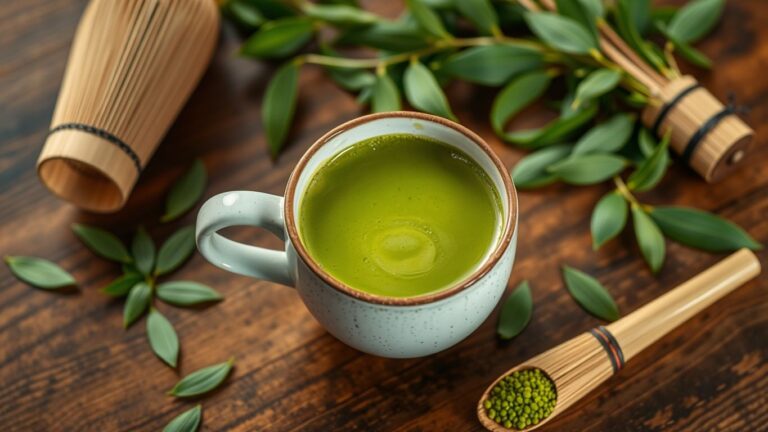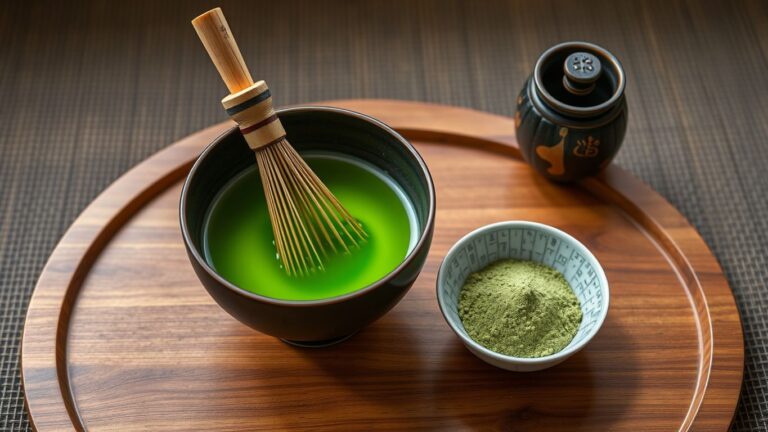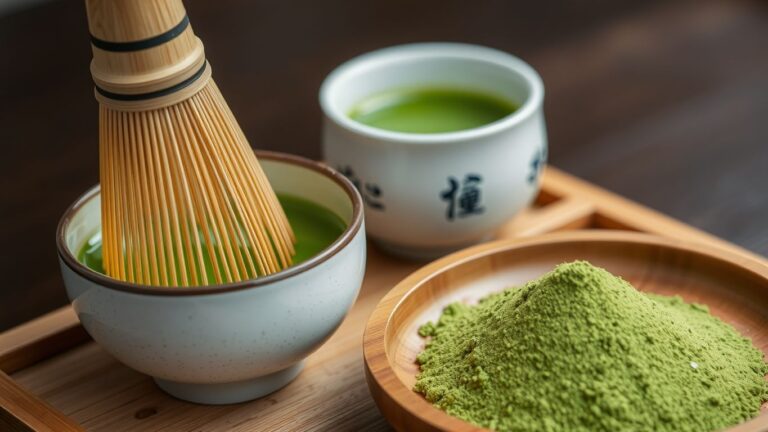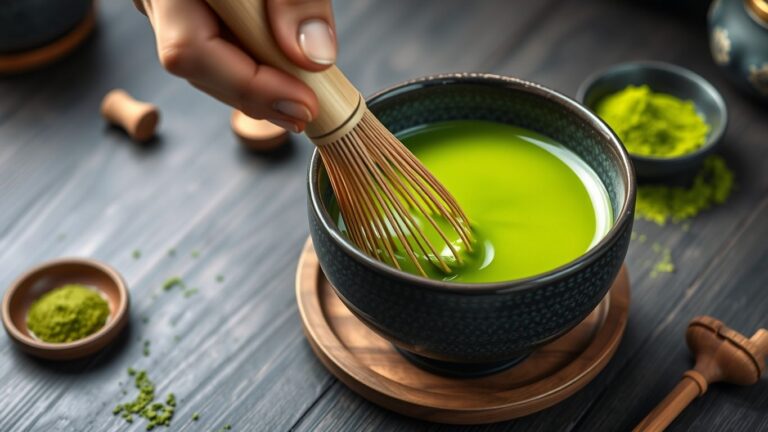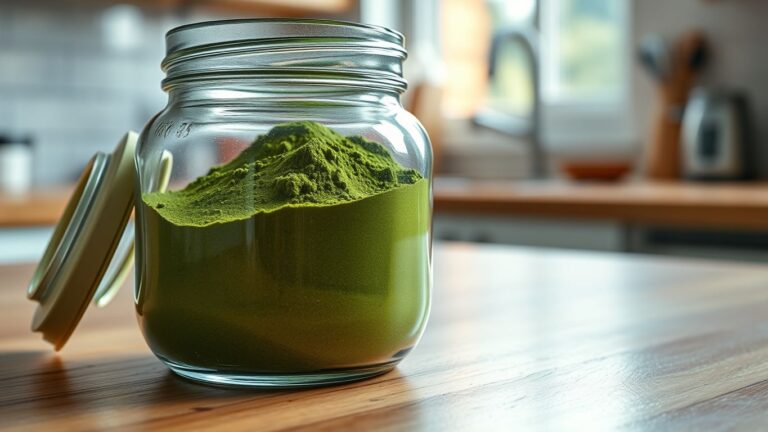Fasting has become a popular health trend, with many people exploring its benefits like weight loss, improved metabolism, and better overall health. But if you’re a fan of matcha, you might wonder if drinking it will break your fast. This article dives into the details of fasting, the benefits of matcha, and whether you can enjoy this vibrant green tea without disrupting your fasting goals.
Key Takeaways
- Matcha Won’t Break Your Fast: When consumed plain, matcha’s minimal calorie content and low impact on insulin levels mean it won’t break your fast.
- Fasting Benefits: Matcha can enhance fasting benefits like weight loss, better metabolism, and autophagy.
- Keep It Simple: To maintain your fast, avoid adding milk, sweeteners, or other ingredients to matcha during fasting periods.
- Prolonged Fasting Caution: During prolonged water fasting, it’s generally recommended to avoid any caloric intake, including matcha, to achieve deeper fasting benefits.
- Antioxidant Boost: Matcha contains antioxidants like catechins, which provide extra health benefits during fasting.
Understanding Fasting and Its Benefits
Fasting is a practice where you abstain from food for a certain period. It’s like giving your body a break to focus on important repairs. Think of it as a restaurant closing for a day to clean up. This downtime helps your body clear out damaged cells and improve overall function.
Different Types of Fasting
There are several ways to fast, each with its own schedule:
- 16:8 Fasting Schedule: You fast for 16 hours and eat during an 8-hour window. For example, you might eat from noon to 8 PM and fast the rest of the time.
- Alternate-Day Fasting: You eat normally one day and then eat very little or nothing the next day.
- Time-Restricted Feeding: Similar to 16:8, but the eating and fasting windows can vary.
Health Benefits of Fasting
Fasting offers many health benefits:
- Weight Loss: By reducing your eating window, you naturally consume fewer calories.
- Improved Metabolism: Fasting can help shift your body’s energy source from glucose to stored fat, promoting fat burning.
- Cellular Repair: Fasting triggers autophagy, a process where your body cleans out damaged cells and regenerates new ones.
Common Misconceptions About Fasting
There are some myths about fasting that need to be cleared up:
- Fasting is Starving: Fasting is not the same as starving. It’s a controlled practice with specific time frames.
- You Lose Muscle: Proper fasting doesn’t lead to muscle loss if done correctly.
- It’s Only for Weight Loss: While weight loss is a benefit, fasting also improves metabolic health and longevity.
Intermittent fasting has been shown to have several positive health outcomes, from reducing insulin, appetite, and inflammation to improving health conditions.
What is Matcha?

Origins of Matcha
Matcha is a special type of green tea that comes from Japan. It has been used in traditional Japanese tea ceremonies for centuries. The process of making matcha involves growing the tea plants in the shade for about three weeks before harvest. This increases the chlorophyll content, giving matcha its bright green color.
Nutritional Profile of Matcha
Matcha is packed with nutrients. It contains vitamins like A, C, and E, as well as minerals such as potassium and magnesium. One of the standout features of matcha is its high antioxidant content. In fact, it has 10 times more antioxidants than regular green tea. These antioxidants help fight free radicals in your body, which can cause damage to your cells.
Health Benefits of Matcha
Drinking matcha can offer several health benefits. It can help boost your metabolism, making it easier to burn calories. Matcha also contains L-theanine, an amino acid that promotes a state of calm alertness. This makes it a great choice for those who want to stay focused without the jitters that come from coffee. Additionally, matcha supports natural detoxification processes in the body, thanks to its high chlorophyll content.
Does Matcha Break a Fast?
When you’re fasting, it’s crucial to know what can and can’t break your fast. Let’s dive into whether matcha fits into your fasting routine without causing any disruptions.
How Matcha Enhances Your Fast
Boosting Metabolism
Matcha is known for its ability to boost your metabolism. The high amounts of the polyphenol EGCG in matcha powder help increase fat oxidation, making your body more efficient at burning stored fat. This is especially beneficial during fasting when your body relies on fat for energy.
Appetite Suppression
One of the most challenging aspects of fasting is dealing with hunger. Matcha can help with this. The natural caffeine and L-theanine in matcha work together to provide a feeling of being focused and calm, which can help suppress your appetite. Even the water you consume with matcha helps to expand your stomach, sending signals to your brain that you’re full.
Improving Cognitive Function
Fasting can sometimes make it hard to concentrate. Matcha can help improve your cognitive function during a fast. The combination of caffeine and L-theanine in matcha provides a steady boost of energy without the jitters, helping you stay alert and focused. This can be particularly useful when you need to stay productive during your fasting period.
Matcha not only preserves your fasted state but also amplifies the benefits of fasting through its unique nutritional profile.
Matcha vs. Other Beverages During Fasting

When fasting, choosing the right beverage can make a big difference. Let’s compare matcha with other popular drinks to see how it stacks up.
Matcha vs. Coffee
Matcha and coffee are both popular choices, but they offer different benefits. Matcha provides a calm, long-lasting energy boost thanks to its L-theanine content, which slows down caffeine absorption. Coffee, on the other hand, gives a quick spike in energy that can lead to jitters. Matcha also has more antioxidants, which can help with overall health.
Matcha vs. Green Tea
While both matcha and green tea come from the same plant, matcha is more concentrated. This means it has more antioxidants and nutrients. Green tea is still a good option, but matcha offers a bigger nutritional punch.
Matcha vs. Herbal Teas
Herbal teas are generally non-caloric and won’t break your fast. However, they don’t offer the same energy boost or antioxidant levels as matcha. If you’re looking for a drink that supports your fasting goals, matcha is a better choice.
Preparing Matcha for Fasting
Traditional Preparation Methods
To make traditional matcha, start by heating the matcha bowl (chawan) with hot water. Swirl it around three times, then discard the water. Next, place one bamboo scoop (chashaku) of matcha into the bowl. Add a small amount of hot water and whisk vigorously with a bamboo whisk (chasen) until frothy. This method preserves the authentic taste and texture of matcha.
Modern Preparation Techniques
For a quicker method, you can use a matcha shaker or an electric frother. Simply add matcha powder and hot water, then shake or froth until well mixed. This is a convenient option for those on the go.
Common Additives to Avoid
When preparing matcha for fasting, avoid adding sweeteners, milk, or cream. These additives contain calories and can break your fast. Stick to plain matcha to maintain the benefits of fasting.
Preparing matcha correctly ensures you get the most out of its health benefits while keeping your fast intact.
Common Concerns About Matcha and Fasting

Fasting is a powerful tool for health, but it’s often accompanied by questions and misconceptions, especially when it comes to adding matcha into the mix. Let’s clear up some common concerns:
Tips for Incorporating Matcha into Your Fasting Routine

Best Times to Drink Matcha
To get the most out of matcha during your fast, timing is key. Morning is often the best time to enjoy matcha, as it can provide a gentle energy boost to start your day. If you prefer, you can also drink it in the afternoon to help maintain your focus and energy levels.
Pairing Matcha with Other Fasting Practices
Matcha can be a great addition to various fasting practices. Whether you’re doing intermittent fasting or a more extended fast, matcha’s low-calorie content and minimal impact on insulin levels make it a suitable choice. It can also enhance the benefits of fasting, such as boosting metabolism and supporting fat oxidation.
Listening to Your Body
It’s important to listen to your body when incorporating matcha into your fasting routine. If you experience unusual discomfort during exercise or other activities, it might be a sign to adjust your matcha intake. Everyone’s body reacts differently, so pay attention to how you feel and make changes as needed.
Remember, the key to a successful fasting routine is to stay in tune with your body’s needs and responses. Matcha can be a valuable tool, but it’s essential to use it in a way that supports your overall health and well-being.
Real-Life Experiences with Matcha and Fasting
Testimonials from Fasting Enthusiasts
Many people have shared their positive experiences with incorporating matcha into their fasting routines. For instance, some enthusiasts find that matcha helps them maintain energy levels and focus throughout their fasting periods. One common highlight is the smooth, sustained energy that matcha provides, thanks to its unique combination of caffeine and L-theanine.
Expert Opinions
Experts in nutrition and fasting often recommend matcha as a fasting-friendly beverage. They point out that matcha’s low caloric content and minimal impact on insulin levels make it an ideal choice for those looking to enhance their fasting benefits. Additionally, the antioxidants in matcha, such as catechins, support overall health and can even boost fat oxidation.
Case Studies
Several case studies have documented the benefits of matcha during fasting. For example, one study found that participants who drank matcha during their fasting periods experienced improved cognitive function and reduced hunger levels. Another case study highlighted how matcha’s catechins, especially epigallocatechin gallate (EGCG), can enhance fat oxidation, making the body more efficient at burning stored fat—a key goal in many fasting protocols.
When consumed plain, matcha not only preserves your fasted state but also amplifies the benefits of fasting through its unique nutritional profile.
Frequently Asked Questions About Matcha and Fasting
Does Matcha with Sweeteners Break a Fast?
Yes, adding sweeteners to your matcha can break a fast. Sweeteners, even natural ones, introduce calories and can trigger an insulin response. Stick to plain matcha to maintain your fast.
Can I Add Milk to My Matcha?
No, it’s best to avoid adding milk to your matcha during fasting. Milk contains calories and can disrupt your fast. If you want to enjoy matcha without breaking your fast, drink it plain.
How Much Matcha is Too Much During a Fast?
While matcha is low in calories, it’s still important to consume it in moderation. Drinking too much matcha can lead to excessive caffeine intake, which might cause jitters or disrupt your sleep. A good rule of thumb is to stick to 1-2 servings per day during your fast.
Remember, matcha is a powerful tool to help you stay energized and focused during your fast. Just be mindful of how you prepare it and how much you consume.
Conclusion
In summary, matcha is a great choice for those who are fasting. Its low calorie content means it won’t break your fast, and it can even enhance the benefits of fasting. Matcha can help you stay focused, curb your appetite, and boost your metabolism. Just remember to drink it plain, without any added milk or sweeteners, to keep your fast intact. So, if you’re looking to make the most of your fasting routine, consider adding a cup of matcha to your day.
Frequently Asked Questions
Does plain matcha break a fast?
No, drinking plain matcha without any additives like milk or sweeteners does not break a fast. Matcha has very few calories, making it a suitable option during fasting.
How many calories are in a serving of matcha?
A typical serving of matcha (1 teaspoon or 2 grams) contains fewer than 5 calories. This low calorie count means it is unlikely to interrupt your fast.
Can I add sweeteners or milk to my matcha while fasting?
It’s best to avoid adding sweeteners or milk to your matcha during fasting. These additives can introduce calories and potentially break your fast. Stick to plain matcha for the best results.
Is matcha good for intermittent fasting?
Yes, matcha is a great choice for intermittent fasting. It provides a gentle energy boost, supports metabolism, and enhances the benefits of fasting without breaking the fast.
Can I drink matcha during prolonged fasting?
During prolonged fasting, such as water fasting, it’s usually recommended to avoid any caloric intake, including matcha. However, for less strict fasting methods, matcha might still be suitable.
How does matcha compare to green tea for fasting?
Matcha is more concentrated in nutrients and antioxidants compared to regular green tea. Its higher catechin content, especially EGCG, makes it more effective at supporting fat burning and autophagy during fasting.
Will the caffeine in matcha break my fast?
No, the caffeine in matcha won’t break your fast. The caffeine is balanced by L-theanine, which smooths out the energy boost and prevents spikes and crashes, making it a safe option during fasting.
Does matcha affect ketosis?
No, matcha supports ketosis. Since it has almost no calories, it won’t kick you out of ketosis. The antioxidants in matcha may even help with fat burning, enhancing the benefits of a ketogenic state during fasting.

